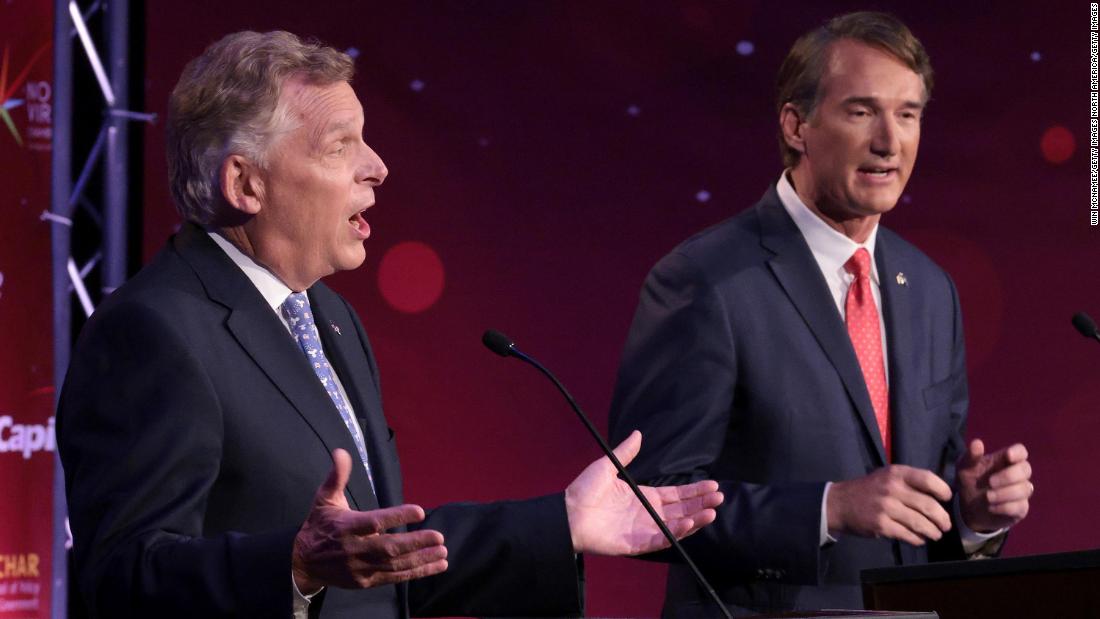
(CNN)The political world eagerly awaits results from Tuesday's Virginia gubernatorial race, but they won't yield much new information about 2022 and beyond.
Republican candidate Glenn Youngkin has run a strong race in a Democratic-trending state -- which, if that translates into victory, would match Virginia's longstanding pattern of rewarding the party that lost the White House the year before. A Youngkin victory would be no surprise, though polls generally show a close race with Democratic opponent Terry McAuliffe.
Republicans nationally are poised for gains in next year's midterm elections - reflecting the nation's longstanding pattern of rewarding the party that lost the White House two years before. So long as Americans remain uneasy about the pandemic, the economy, and President Joe Biden's leadership, Democrats stand to lose control of Congress whether or not McAuliffe manages to keep the Virginia governor's mansion in his party's hands.
"If McAuliffe wins by one or loses by one, is the message going to be any different?" asked Larry Sabato, who directs the University of Virginia Center on Politics. "No -- it's going to be a tough midterm."
The prospect of 2021 and 2022 elections following established trendlines says little in particular about Youngkin, McAuliffe, Virginia, congressional Democrats, or Biden. They simply represent new cast members in a familiar political play.
All eyes on a new President
The same tidal forces shape the odd-year and midterm contests following a race for the White House. As the nation's highest-profile public official, a new President quickly becomes the focus of prevailing public discontents.
Biden's recent struggles have dragged his approval ratings underwater, nationally and in Virginia. Four years ago, then-President Donald Trump was in even worse political shape in the wake of his erratic behavior, racial provocations, and attempt to repeal the Affordable Care Act.
Similar dynamics have produced victories for the party not occupying the White House in 10 of the last 11 Virginia gubernatorial elections. They've produced US House seat gains for the party not occupying the White House in nine of the last 11 midterm contests.
During that period, the pattern offered no clear guidance about the reelection prospects of the presidents involved. Four of them (Ronald Reagan, Bill Clinton, George W. Bush and Barack Obama) won a second term; three (Jimmy Carter, George H.W. Bush and Trump) did not.
Occasionally, Virginia and midterm results have diverged. That gives congressional Democrats reason to hope for shifting political winds over the next year even if Youngkin wins on Tuesday.
In 1998, during Clinton's presidency, House Democrats gained seats despite the furor over his affair with Monica Lewinsky. In 2002, with the younger Bush in the White House, House Republicans did the same. Both results followed Virginia gubernatorial victories by the other party.
McAuliffe knows the one-of-eleven Virginia exception well. It was his 2013 win for governor after Obama's 2012 reelection.
That did not presage a strong 2014 Democratic midterm. Republicans went on to capture full control of Congress, allowing them to stymie Obama's legislative agenda for the balance of his term.
Partisan shifts
To some degree, McAuliffe's 2013 victory reflected Virginia's long-term trend toward his party as the swelling ranks of moderate suburban voters gained clout at the expense of rural conservatives. After losing the state in 10 straight presidential elections beginning in 1968, Democrats have carried it in the last four.
Biden beat Trump by 10 points there last year. That makes last week's Fox News poll -- showing Youngkin ahead by 8 points among likely voters -- all the more striking for its hint of a major partisan shift.
Yet an 18-point swing in election margins from presidential to gubernatorial contest would hardly be unprecedented. After Obama won Virginia by 6 points in 2008, Republican Bob McDonnell won the governorship by 17 points a year later. After Reagan won Virginia by 25 points in 1984, Democrat Gerald Baliles won the governorship by 10 the next year.
Polling averages show the McAuliffe-Youngkin race neck-and-neck. As Biden struggles politically -- a new NBC News poll measures his approval at just 42% nationally -- Virginia Democratic strategists fear subpar enthusiasm among their supporters could tilt the race against them.
It doesn't take much electoral acumen to know that if the President remains at 42% next November, national Democratic strategists will have good reason to fear the same thing. McAuliffe's fate on Tuesday won't change that.
"From a political analysis perspective, there's really not that much difference between a 50-49 win and a 49-50 loss," Sean Trende, the senior elections analyst for RealClearPolitics, tweeted last week. "It matters for power, but not really for getting a sense of the state of affairs."
"in" - Google News
November 01, 2021 at 03:25AM
https://ift.tt/3mtpXtl
Why Republicans are poised for gains in 2022 regardless of who wins in Virginia on Tuesday - CNN
"in" - Google News
https://ift.tt/2MLa3Y1
https://ift.tt/2YrnuUx
Bagikan Berita Ini














0 Response to "Why Republicans are poised for gains in 2022 regardless of who wins in Virginia on Tuesday - CNN"
Post a Comment